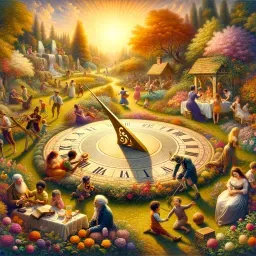Nothing will come of nothing

0
0
0
0
- Meaning
- The phrase "Nothing will come of nothing" means that without effort, investment, or input, you cannot expect to receive any output or reward. Philosophically, it underscores the importance of action and initiative to achieve any result. It touches on the inevitability of causality, emphasizing that stagnation and inactivity produce no fruitful outcomes.
- Allegory
- The image elements include the diligent gardener representing active effort and dedication. The bountiful garden symbolizes the productive results of hard work. The barren plot of land signifies the outcomes of inaction, emphasizing the message that no effort leads to no results. The bright sun above serves as a metaphor for the hope and rewards that come with persistent effort. Together, these elements illustrate the importance of taking initiative and the causality between effort and results, resonating with the phrase "Nothing will come of nothing."
- Applicability
- This phrase can be applied to various aspects of personal life, including education, career, relationships, and personal growth. It serves as a reminder that success, progress, and productive results require active effort, dedication, and sometimes risk-taking. For example, in a career context, it might remind someone that they need to seek opportunities and work hard to achieve their goals instead of waiting for success to come to them.
- Impact
- The phrase has resonated widely in literature, philosophy, and everyday discourse. Through centuries, it has been quoted to inspire action and effort. The impact of the phrase is significant in educational and motivational contexts, often being used to encourage people to take the initiative and put effort into their endeavors.
- Historical Context
- "King Lear" was written around 1605-1606, during the Jacobean era in England. This period was characterized by political instability and profound social changes. The play explores themes such as power, loyalty, and madness in the context of family dynamics and governance, which reflects the societal concerns of Shakespeare's time.
- Criticisms
- One possible critique of the phrase is that it suggests a somewhat deterministic view of life, implying that effort is always rewarded with results. It can be argued that sometimes, despite best efforts, external factors beyond control can prevent success, which the phrase doesn’t account for. Therefore, it’s important to balance this sentiment with a recognition of factors like luck and circumstance.
- Variations
- Variations of this phrase can be found in different cultures and languages, each highlighting the importance of effort and action. For instance, a similar sentiment is expressed in the Biblical verse "For whatever a man sows, that will he also reap" (Galatians 6:7). Eastern philosophies and proverbs also stress effort, such as the Japanese saying "Fall seven times, stand up eight" (七転び八起き, Nanakorobi yaoki).
-

It is better to be alone than in bad company.
-

What a piece of work is a man! How noble in reason, how infinite in faculty!
-

Der frühe Vogel fängt den Wurm.
-

O, what a rogue and peasant slave am I!
-

Facts are stubborn things; and whatever may be our wishes, our inclinations, or the dictates of our passion, they cannot alter the state of facts and evidence.
-

With mirth and laughter let old wrinkles come.
-

Love is not love which alters when it alteration finds, or bends with the remover to remove.
-

Pleasure and action make the hours seem short.
-

All's well that ends well.
-

Reputation is an idle and most false imposition; oft got without merit, and lost without deserving.
No Comments